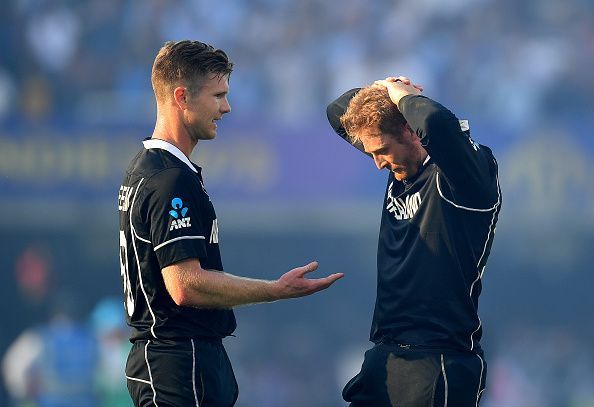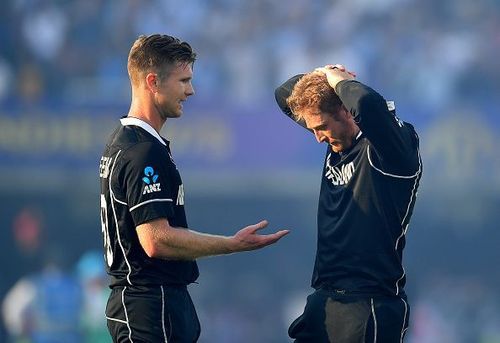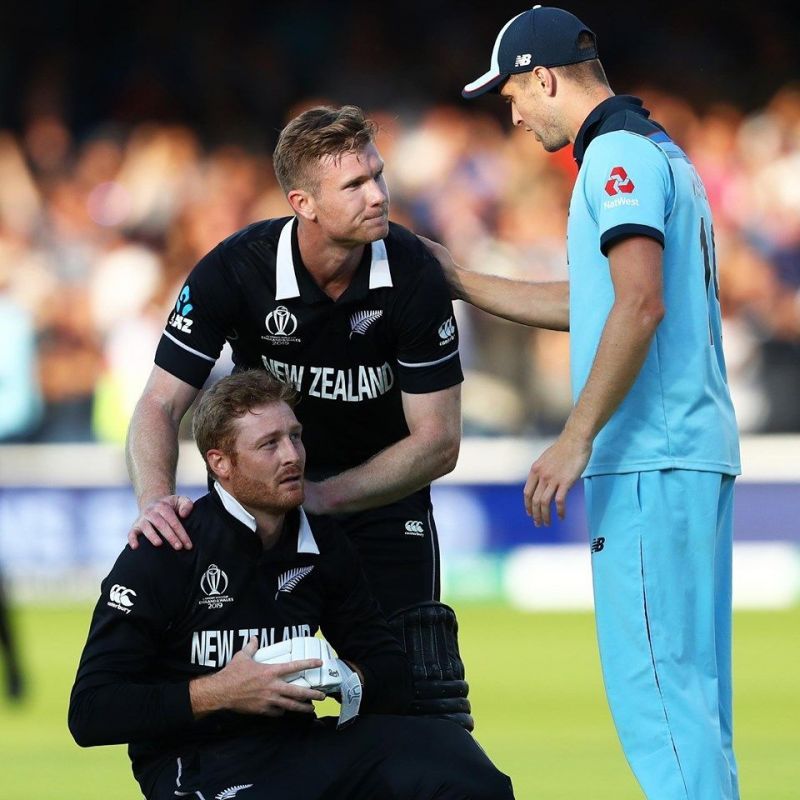
World Cup 2019: The fault in New Zealand’s stars

Exquisite! Exciting! Incredible! Riveting! Scintillating! Sensational!
Throw in all the adjectives you want, analogize everything you witnessed to a roller coaster ride at Six Flags or a Steven Spielberg thriller. Eat your heart out, Game of Thrones, Red Wedding episode; this match had a more dramatic ending, for real hearts were wounded over the fictional ones that were stabbed.
No seriously, throw in every word that you can find, because that’s what these 22 individuals did in some capacity or the other - they threw the kitchen sink, every weapon in their armory and every arrow in their quiver. And yes, there was an individual named Jofra Archer who fired his own arrows in the end, but that’s beside the point.
But as the late Trinidadian writer C.L.R James said, “What do they know of cricket, that only cricket knows”? And ergo, what do we know of the finals, that only the finalists know? We saw it, but can we truly empathize with the ecstasy and agony in a single frame, if we weren’t in one of the squads?
It made sense that a victor would be crowned, but it made little sense how. England won by zero runs and New Zealand lost by zero runs - not once, but twice. So England didn’t win it and New Zealand didn’t lose it, yet the World Cup, the crown jewel of London for the day went to England.
The post-mortem results are plenty, and we can start with the obvious the bat of god. Ben Stokes, who wielded the willow so well, inadvertently stuck the same wood out too much, and connected with the ball (when he shouldn’t have). The ball (as if there were English Angels in the Outfield) raced to the boundary, and the umpire had no choice but to signal four.
If only it had stayed four, or even five. But the umpire signaled six (four + two = ?). It was an egregious sin given the high stakes of the match; a closer inspection revealed that it was indeed an error of judgement to award England six instead of five runs.
But was that the only error? The umpire did strike back a few times – Ross Taylor given out when he wasn’t, and Jason Roy given not out, when he could have been. Were the runs won and lost there?
It couldn’t have been a case of bad karma, because New Zealand are the quintessential good boys of cricket. They’re everyone’s second favorite team. Surely the fate gods wouldn’t deal them a cruel blow.
But the stars present on the New Zealand flag didn’t align for them in the sky. How cruel was it, you ask? Why even Trent Boult, who was ever so impressive in the tournament, took a brilliant catch of Ben Stokes in the deep, only to find, gulp, that he had stepped on the rope - when he could have tossed the ball sooner to the ever-agile Martin Guptill standing right beside him.
That was the first of two cruel six runs for Stokes in the last over. Oh dear, did I just mention Guptill?
If the changing tides of luck and fate needed to be epitomized, Guptill's role in the last two matches of the World Cup would fit the bill perfectly. On another day, Guptill’s brilliant throw would have hit the stumps and won his team the match – like it did to dismiss MS Dhoni in the semifinal. But in the final, his throw ricocheted off Stokes’ bat, and I can’t bear to write what happened again.
If Guptill won the semi-final for New Zealand by millimeters, he lost the final by a few centimeters - when he was batting. As he scampered back for the second run in the Super Over he fell short of the crease, and New Zealand could only tie the match.
Yes, New Zealand tied, reiterating that England didn’t win it, and New Zealand didn’t lose it. But there was still disbelief in both camps. One couldn’t believe they won it, and the other couldn’t believe they had lost it.
The ICC's rule of declaring England the victors on the basis of most boundaries scored, has left the entire cricketing world with more salt than they can handle. Some of the salt was already thrown into New Zealand’s fresh wound, but you wouldn’t know it when Kane Williamson smiled in the press conference, epitomizing grace and sportsmanship.
The arbitrary rule of the ICC was such that if wickets were a measure over boundaries, the World Cup would be going to the antipodes.
There is a profound overtone here. The fact that the ICC couldn’t ascertain a clear winner and had to resort to something as arbitrary as boundaries, perhaps shows how the sport is still lacking in some foundations. Granted, the ICC is far from FIFA and football, which is more concrete in rules and where more parties have a stake. But there have still been quite a few rule changes in recent times; why couldn't this rule have been changed too?
In the last decade or so, we have a seen a new format emerge in cricket, powerplays come in (rules changed on that), super subs go out and so too bowl outs. But the Super Over came in, and ultimately decided a final - while also not deciding it.
For my American brother-in-law, and American friends watching the match with me, I had to describe the rapid pendulum movements of the match in a football (soccer for your American tongue) context. England and New Zealand ended with a scorecard reading 4-4 at the end of 90 minutes. Throughout the game back and forth goals were scored, touch and go penalty calls awarded to England and taken away from New Zealand.
The archetypal edge-of-the-seat match, with momentum swinging rapidly. Two of those goals on either side came in the closing seconds of extra time. There were 'they've got it, no they've lost it, no they've got it again' moments.
Then it went to penalty shoot outs, and once again, the momentum kept swinging with hits and heroic saves; it finished 3-3 after five shots and there was still no clear winner.
So then we moved to sudden death, and after three more shots each, there was still no clear winner. England were awarded the cup on an arbitrary rule which was akin to something like they had more shots on target.
As Greg Baum rightly wrote in the Sydney Morning Herald, “great sports contests should be won by what happens next, not last.” There was barely a hair separating both teams, yet many remained flummoxed as to why the spoils weren’t shared.
Simon Jenkins of The Guardian believes the right result would have been a tie, but said it wasn't so because “human nature hates a balance. It craves a victor and a vanquished. The sporting solution would be for both captains to admit the fact and shake hands. But the money, the chauvinism, the howls from the gallery, were more powerful."
Speaking of powerful, I could only imagine how the megalomaniac-filled BCCI would have reacted had India been on the receiving end of this. A rematch perhaps? A letter to the ICC to boycott the ECB and a letter the Ministry of External Affairs? No, go higher - the Prime Minister’s Office would have been asked to cut off all ties with the United Kingdom.
Hyperbole aside, this event accentuates just how sporting Kane Williamson and his entire ‘high flying Kiwis’ have truly been.
So if England didn’t win and New Zealand didn’t lose, did cricket really win? It did entertain, but did it win if it left people feeling that gross injustice had been done? Did it win if it made New Zealand feel like they were dealt the worst kind of injustice imaginable?
But cricket is unassumingly beautiful, above other cash-rich tournaments that serve the coffers of a few. I would be remiss if I didn’t congratulate England on their maiden World Cup win, in their fourth final since 1979. For a country that invented the sport as early as the Saxon-Norman Times circa 16th century, this was no doubt a long time coming; 44 years to be precise.
Last year in Russia, the English fans regurgitated the "It's Coming Home" song throughout the FIFA World Cup as England marched to the semi-final, hoping for a 1966 encore. How appropriate then that the country that invented another sport, won the World Cup in their own backyard and at the proverbial home of cricket.
Like Wembley in 1966, like Lord’s in 2019, the Barmy Army traveled the world in search for glory, only to find it at home.
For the paparazzi in the United Kingdom, the win provided a break from breaking ties with the European Union (EU). But since immigration is such a contentious issue the world over, the press would do well to remind certain policy makers that the English team was led by an Irish-born captain (Eoin Morgan), and a South African-born fielder (Jason Roy) effected the final throw to win the cup.
They are also indebted to a Barbados-born bowler (Jofra Archer), who bowled the last over. And the biggest irony of all? It was the New Zealand born Ben Stokes who won the match for England. Also in the mix were British Pakistanis - Adil Rashid and Moeen Ali - who played vital roles in the campaign.
I want to end with two images that stood out for me. The first was England’s Chris Woakes consoling a dejected Martin Guptill and Jimmy Neesham.

This image will go down for posterity’s sake - the same way the picture of Grant Elliot lifting Dale Steyn after the semi-finals in 2015 did, the same way the picture of Allan Donald being left stranded halfway down the Edgbaston pitch with the late Hansie Cronje having his arms on his hips in 1999 did, and the same way the picture of Andrew Flintoff consoling a despondent Brett Lee after the second Ashes test of 2005 did.
The biggest cricket match on the world stage was finally decided by the smallest of margins in Guptill’s run out. A call to Kipling once again - let’s treat triumph and disaster as the same imposters. It was certainly one winner, but two champions.
The second image circulated is of this cherubic 11-year-old boy, born in Christchurch, seen cheering for the Auckland Warriors in his favorite sport, rugby. Had he been told then that in 16 years’ time he would make it big for his country on the greatest stage of all, he would have assumed it would be playing for the All Blacks in rugby.

Perhaps if rugby coach Gerard Stokes hadn’t moved with his family to the UK in 2003, Ben Stokes could have been the pride of New Zealand and not its nemesis last Sunday. But life and fate had different plans for Ben, for England and for New Zealand in the years to come.
It may be best to sum it up by saying that perhaps, just perhaps, the fault was in New Zealand’s stars. How else could anyone explain it all?